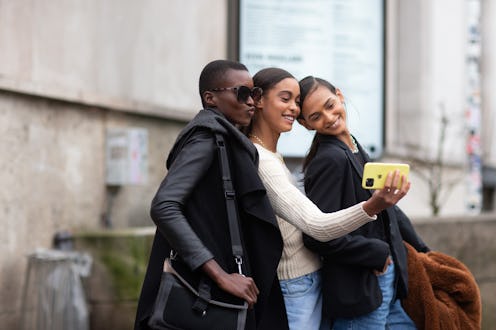(Living)
Do Enneagram Types Matter In Your Relationships? Experts Weigh In

There are many signs to look for when you're trying to suss out whether a relationship — whether romantic, platonic, or work-related — is going to be a a successful one. Some may look to the stars while others analyze personality types for insight on the likelihood of (or lack thereof) compatibility. If you're in the latter category, one source for learning more about yourself or another person is the Enneagram test. But can it give you clues as to which Enneagram types are most compatible? The Zoe Report consulted with a few experts on what you can and can't learn from the test — and the results may not be what you expected.
If you're not familiar with the Enneagram test, or haven't yet taken one, it's probably most helpful to start by explaining what it is, and what it can reveal about you or someone else. "The Enneagram is an ancient system that is made up of nine personality types," says Gina Gomez, Enneagram educator, self-discovery coach, and author of The Enneagram & You. "What makes it stand out from all the other personality systems out there is that it combines the spiritual wisdom of its creators and modern-day psychology. Most importantly, the Enneagram is an invaluable tool to cultivate compassion for ourselves and others."
Though developed by Oscar Ichazo and psychiatrist Claudio Naranjo, some of the Enneagram's concepts are often attributed to other mystics and educators. The nine personality types consist of: Reformer (ethical, perfectionistic), Helper (prideful, possessive), Achiever (ambitious, impatient), Individualist (imaginative, sensitive), Investigator intellectual, withdrawn), Loyalist (trustworthy, perceptive), Enthusiast (adventurous, self-involved), Challenger (assertive, confrontational), and Peacemaker (accepting, stubborn), and Gomez explains that it's not uncommon to align with the traits of more than one. "[You] might see yourself in several of the types," she says. "That’s because we all exhibit most if not all of these behaviors, but it’s the motivation behind why we do what we do that will help you to find the Enneagram Type you most identify with."
Gomez believes it's understandable to want to use your — or someone else's — determined type as a way of predicting whether or not you'll be compatible, but she says it's not quite so simple. "When it comes to Enneagram pairings, there isn’t a combo that is more successful than any other," she explains. "This is because, in order to have a healthy and loving relationship, both people need a good dose of self-awareness and a willingness to doing the inner-work that’s required to understanding and accepting each other. All 44 pairings in each context (ie: friendship/family, love, and workplace) will have their own set of strengths, challenges, patterns, and ways they can learn and grow together."
And relationship coach Lee Wilson agrees. "There aren't two types that [necessarily] work poorly together in a relationship," he says. "All relationships are successful when the two involved respect each other and empathize. All types are capable of this and of complementing each other's strengths and weaknesses." That said, both experts would agree that communication is a far better tool for making your relationship work — regardless of your Enneagram type.
That said, knowing which types you and your mate/co-worker/friend/etc fall into might give you more understanding and compassion — which can be helpful if communication struggles pop up, even if you're opposites. "Let’s take a very common romantic pairing like [Helper] and [Challenger]," Gomez says. "When self-aware, these two can really support each other’s growth and path to healing. For example, [Helpers] tend to fear speaking up for themselves or asking for what they need, whereas a [Challenger] is able to be a great example of how self-loving it can be to be assertive and create boundaries when needed."
And Wilson notes that Reformers and Enthusiasts, while vastly different, can still make a great pairing if their differences compliment one another's. "The Enthusiast can get the Reformer to take a vacation or not be stressed by the chaos that goes on in the world," he says. "Reformers can often help Enthusiasts to remember their long-term goals and desires for life in addition to encouraging them to do important things that can allow them to afford the things they often anticipate."
While both experts believe the Enneagram test to be a helpful tool in many ways, it certainly shouldn't be the key determining factor for whether or not to embark on a given relationship. Listening, learning, and the ability to adapt can help you better navigate any dynamic — but understanding who both of you are in the context of the test might just be a helpful tool to have in your belt, too.
This article was originally published on